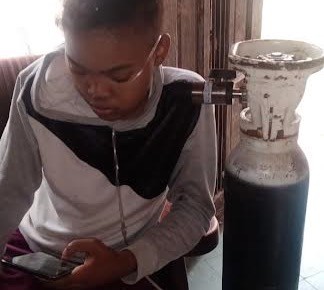
6 July 2022
Unakho Kewana is dependent on electricity for her oxygen supply. Photo supplied
When the power goes off, it is a scary moment for Unako Kewana. The East London 18-year-old depends on electricity to breathe properly.
She breathes with the assistance of a device that supplies oxygen. When the power is off she has to reduce the amount of oxygen the device delivers or it runs out of oxygen within about 15 minutes.
She does not have backup power.
Kewana was diagnosed four years ago with chronic obstructive pulmonary disease. She has to be connected to oxygen all the time.
Her doctor advised her to quit school. Kewana does not travel or go outside her mother’s Mdantsane home.
“It’s important for those with low oxygen to stay plugged in at all times,” she told GroundUp.
During recent loadshedding, she has had to call an ambulance almost every day to help her breathe. “It becomes a life threatening situation,” said Kewana. When loadshedding happens she gets panic attacks.
“My life is at risk,” she said.
Kewana says she cannot afford a solar panel or generator on her monthly disability grant. Her mother, Nontobeko Kewana, is also dependent on a social grant after she suffered a stroke in 2016. The trip to Cecilia Makiwane Hospital, for checkups or in emergencies, costs R200. “I don’t always have the transport money to take her to the hospital.”
“It’s painful what she is going through.”
Professor François Venter is the director of Ezintsha, a public health research institute at Wits University. “Loadshedding is a serious problem for some patients,” he said. “Not only for those with lung disease who rely on oxygen and nebuliser devices at home, but also for people who receive dialysis at home.”
“I cannot imagine the fear people dependent on failing health systems must feel,” Venter said. “They can’t buy their way out of trouble. This government relentlessly fails poor people.”